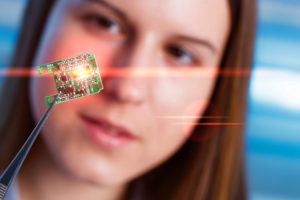
The American Cancer Society reports that more than 250,000 women—and more than 2,000 men—will be diagnosed with invasive breast cancer this year. Even as it remains the second leading cause of death for women, new technological advances are improving treatment and survivorship among breast cancer patients. In order to inform patients about the options available to them, David Weintritt, MD, the founder of the National Breast Center and the National Breast Center Foundation, discussed three technologies that are improving the future of outcomes for breast cancer patients:
- BioZorb is an implantable device created by Focal Therapeutics for women undergoing breast conserving surgery. By giving doctors a clearer target for precise radiation dosing, it can reduce the risks of cancer recurrence while also lowering the total dose of radiation. BioZorb can create better outcomes for patients by reducing the risk of errors, and can even help patients maintain a healthier and more natural appearance after treatments.
- Mammaprint analyzes the genetic code of breast cancer cells to give doctors a more accurate measurement of the risk of recurrence. Created by Agendia, it is the only test cleared by the FDA that provides personalized results for the patient to know with certainty if they have low risk for a cancer relapse, and would not benefit from chemotherapy. Mammaprint eliminates intermediate risks scores to provide Low and High Risk results, removing uncertainty when doctors are making the appropriate cancer treatment decisions.
- SPY Portable Handheld Imager (SPY-PHI) uses SPY Fluorescence Imaging Technology to let surgeons see blood flow and tissue perfusions in real time. This direct access cuts out surgical complications and gives patients more reconstruction options. Made by NOVADAQ and approved by the FDA, SPY-PHI is usable in plastic, reconstructive, microsurgical, and gastrointestinal procedures.
Technology can do a lot to help patients and improve their health outcomes, but not everyone who needs the best tools knows about them. Raising patient awareness about the options available to them is a key step in creating personalized treatment plans that increase survivorship among cancer patients and make a real difference in their lives.
If you’re in healthcare, insurance, technology or other professional services industries, and need help with a PR, marketing or social media campaign, contact Scott Public Relations.
Download our e-book, “The C-Suite Asks, We Answer: The Top 6 Questions About Healthcare PR.”

Like what you’ve read? Follow Scott Public Relations on LinkedIn, Twitter, Facebook, Pinterest, and Google+.
Sign up to receive our monthly advice on healthcare, insurance and technology PR: Scott Public Relations.




